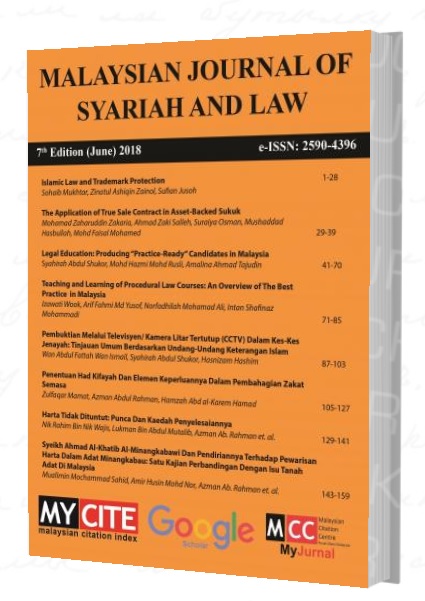المصالح ودورها في الترجيح في بناء الحوكمة الرشيدة في القضايا المعاصرة "دراسة مقاصدية"
The Role of “Maslahah” in establishing good governance in contemporary issues: Maqasid study
DOI:
https://doi.org/10.33102/mjsl.vol6no1.96Keywords:
المصالح، الترجيح، الحوكمة الرشيدة، القضايا المعاصر.Abstract
تتوالى على هذه الأمة قضايا معاصرة كثيرة تمس الحاجة إلى معرفة الحكم فيها، خاصة وأن كثيراً من هذه القضايا المعاصرة، لا يتناولها النص مباشرة، أو قد تكون في متناول النصوص دون القطع، فيختلف النظار في تحقيق مناط الحكم فيها، ولذلك ينبغي أن ينظر إلى هذه النوازل بناءً على ما مراعاة المقاصد والمصالح المترتبة على تحقيق مناط الحكم فيها، حيث وأن الشرع جاء من أجل جلب المصالح ودرء المفاسد، وهذه قاعدة متفق عليها بين أهل العلم قديماً وحديثاً، ومن هنا تأتي أهمية حديث النبي صلى الله عليه وسلم: "من يرد الله به خيرا يفقهه في الدين.(1987AL-Bukhari,). النبي صلى الله عليه وسلم ذكر التفقه في الدين، وليس التعلم، إذ أن الإنسان قد يتعلم الحديث ويحفظه، ولكنه في منأى عن فقهه وفهمه، ولذلك فإن مصالح النصوص تتحدد بفقه وفهم العالم لدلالة النصوص، والناس في هذا متباينون وهكذا خلقهم العليم الخبير. وسوف تتطرق الدراسة إلى عدة قضايا مهمة، تتعلق بالترجيح بالمصالح من حيث الأصالة، وأهمية الترجيح بالمصالح في تجاوز بعض النقاط الخلافية إلى ما فيه تحقيق مقاصد الشرعية، من خلال الحرص على ما فيه مصلحة راجحة. ثم كيفية الترجيح بالمصالح في تحقيق مناط الأحكام للقضايا المعاصرة ومدى إمكانية الفهم المصلحي للحكم.
There are many contemporary issues, which are subject to debate among Muslim scholars. This study aims to introduce the concept of legitimate benefits “maslahah shari’ah” as a new lens to allow the scholars to solve their intellectual disagreements. Legitimate benefits concept offers a foundation for scholars, to debate concepts, and to reach an opinion that is applicable in the modern society. Moreover, it allows the revising judgments to adapt to the dynamic nature of our modern societies. The dynamic nature of our modern societies is a source for many challenges to our scholars, and on how they can issue verdicts in many issues that have no clear mention in the traditional sources of Islamic jurisprudence. Hence, the proposed concept of legitimate benefits “maslahah shari’ah” which views the issues and the offered solutions from the benefits that can be reflected on the society with more emphasis on the changes between the old issues and the issues for debate, milieu, differences between similar cases, and the necessities that affect the issue. The study will discuss on several important issues of interest. The first issue is the usage of interest and its roots in Islamic jurisprudence. How the concept of legitimate lenefits “maslahah shari’ah” can be utilized to achieve the ultimate objectives of Shariah. In addition to providing a rationale for applying the concept of legitimate lenefits “maslahah shari’ah” to assess the merits and possible ramification of scholarly opinion on contemporary issues, and how to evaluate the benefits of different scholar’s opinion to reach a better application of scholarly opinion in our modern dynamic societies.
Downloads
References
Ibn Taymiyah, Ahmed bin Abdul Halim. (1408 H/1987). Alftawa Alkubra. (Beirut: Dar ALktub,1.
Ibn Rajab, Abdul Rahman bin Ahmed. (1408) Jamie Aulum walhikam. (Beirut: Dar al-Maarifah, I.
Ibn Ashour, Muhammad al-Taher ibn Muhammad ibn Muhammad. (1984). Alttahrir wa Alttanwear. (Tunisia: Dar Alktub Altonisia.
Ibn Najim, Zain al-Din Hanafi. (tuck). Albahr Alraeaq sharh Kanz aldqaiq. (Beirut: Dar al-Maarifah,.
Abu Dawood, Sulayman ibn al-Ash'ath. (non). Sinan Abi Dawood. (Beirut: Dar al-Kitab al-Arabi.
Al-Bukhari, Mohammed bin Ismail. (1407H/1987).Sahih ALbukari. (Beirut: Dar Ibn Katheer,2.
Baghdadi, Abdul Rahman bin Mohammed bin Askar. Irshad Alssalik ila ashraf almsalik fi fiq Alemam Malik (Cairo: Mustafa Al-Babi Press, 2
Al-Baghawi, Al-Hussein bin Masood fur. (1403H /1983). Sharh Alsunnah. (Damascus: Islamic books, 2.
Al-gauziyah, Mohammed ibn Abi Bakr bin Saad Ibn Qayyim (non). Alttruq Alhukmyah. (non., Library of Dar Al-Bayan.
Zarkshi, Mohammed bin Bahadir bin Abdullah. (1421H /2000). Albahr Almuhit fi Usul Alfiqh. (Beirut: Dar alktub alelmiyah.
AL-Sulami, Abdul Aziz bin Abdul Salam. (1416). Alfuaed fi iqtisar almqasid. (Damascus: Dar alfikr almuasir.
AL-Sulami, Abdul Aziz bin Abdul Salam. (non). Quaed Alahkanm fi Msalih alanam. (Beirut: Dar Al Ma'arif,.
Al-Shatbi, Ibrahim bin Musa bin Mohammed al-Lakhami. (1417H /1997). Almuafqat (non Dar Ibn Affan,1.
Al-Shafei, Mohammed bin Idris bin Abbas. (1410H/1990). Alum. (Beirut: Dar al-Maarifah.
Ali bin Mohammed bin Mohammed. (1419H /1999). Alhawi alkabir. (Beirut: Scientific Book House, I 1).
Al-Ghazali, Abu Hamid Mohammed bin Mohammed. (1993). Almustasfa. (Beirut: Dar alktub alelmyah,1.

Downloads
Published
How to Cite
Issue
Section
License
Copyright (c) 2018 baidar mohammed mohammed hasan

This work is licensed under a Creative Commons Attribution-NonCommercial 4.0 International License.







































